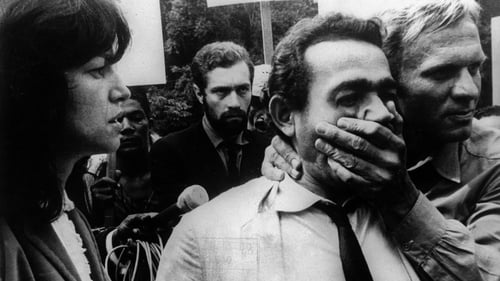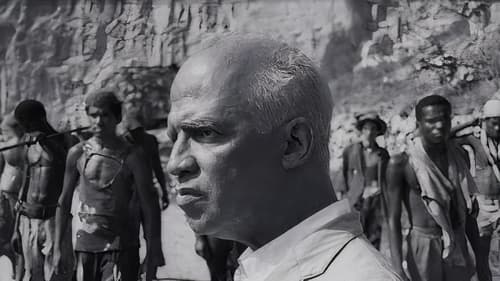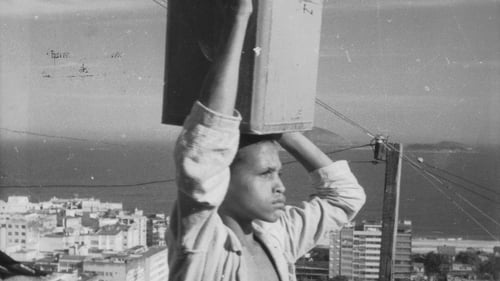Zózimo Bulbul
Рождение : 1937-09-21, Rio de Janeiro, Rio de Janeiro, Brazil
Смерть : 2013-01-24

Himself
The African deity that brought in Brazil Together with the blacks, Exu is known as the orixá of communication, the guard of the streets and the human behavior. The short film of black culture and its assimilation by Brazilian art. In its subtext, the film honors one of the greatest activists of the black cause - the actor, the poet, the playwright and the politician - Abdias do Nascimento. The positioning of the documentary seeks to incorporate the fighting spirit, expressive and restless of Abdias: present link between characters, images and children of the film.

João Cândido
The film narrates the imaginary encounter between João Cândido, leader of Revolta da Chibata and a paper picker and writer Carolina Maria de Jesus, author of the book "Quarto de despejo", in Rio de Janeiro.

Director
The film, shot in Dakar, Senegal, has testimonials from intellectuals, politicians and religious, who present an overview of the 50 years of independence of the countries of West Africa and the interpretation of the sculpture created recently in Senegal, which it represents, precisely, the African renaissance.

The project '5 x slum, now by ourselves' gathered over 80 young people from Rio's favelas (slums), selected through workshops, script and filmmaking techniques to create a feature film consisting of five stories that reflect different facets of the daily lives of residents of these communities - with the promise of escape stereotypical representations.

Director

Carmichael
В небольшом колумбийском городке начинают происходить непонятные вещи: каждую ночь в определенный час на стенах домов появляются различные карикатуры, изобличающие секреты местных жителей. Сначала все считают это неудачной шуткой и опровергают слухи. Однако, когда один мужчина, прочитав о неверности жены на стене, убивает предполагаемого любовника, мэр города объявляет чрезвычайное положение. Вооруженные солдаты начинают патрулировать улицы в поисках злоумышленников...

Director

Marquinhos
É uma lírica história de redenção amorosa entre irmãs, mães e filhas, em uma pequena cidade do interior de Minas Gerais, onde os fantasmas da escravidão e do racismo acentuam os dramas de forma sutil e poderosa.

Writer
A documentary about the celebration of the National Samba Day with the aim of preserving the memory of part of the history of samba, which was being forgotten by the press and the Brazilian people.

Director
A documentary about the celebration of the National Samba Day with the aim of preserving the memory of part of the history of samba, which was being forgotten by the press and the Brazilian people.

Director
Filmed in a mini DV, the film "República Tiradentes" is an affective poetry, based on the stories of gafieira dancers, actors, rascals, girls and all the bohemians who lived and live moments of joy and glory in downtown Rio de Janeiro. It is a tribute mainly to the origin of the gafieira.

Africano

In 1850 the Italian dancer Maria Baderna arrives at Brazil, her fame and the scandals she provokes turns her name in a common expression. The film uses passages supposed to be about her to criticize modern Brazil, the dictatorship period and also a homage to filmmakers like Rogério Sganzerla.

Procópio
Young man, of Portuguese nobility ascendancy, starts working in a rubber plantation in the Amazon, in 1912, and falls in love with pretty Yayá, a married woman.

Director

Writer
In 1988, the centenary of abolition of slavery in Brazil, Zózimo Bulbul made this powerful historical analysis of racial issues in his country. This documentary provides an in-depth look through extensive archival researching and interviews of key figures who were involved in preserving black culture. Aside from historical testimony, this epic documentary also points to the current relevance of facing the racism that still confronts the black population in Brazil.

Director
In 1988, the centenary of abolition of slavery in Brazil, Zózimo Bulbul made this powerful historical analysis of racial issues in his country. This documentary provides an in-depth look through extensive archival researching and interviews of key figures who were involved in preserving black culture. Aside from historical testimony, this epic documentary also points to the current relevance of facing the racism that still confronts the black population in Brazil.

Biography of one of the legendary names in the Samba genre of Brazilian music. Although he could hardly dance or play an instrument, he became one of the main composers of Portela, an important Samba "school" in Rio de Janeiro.


Stone Man
Quilombo dos Palmares was a real-life democratic society, created in Brazil in the 17th century. This incredibly elaborate (and surprisingly little-known) film traces the origins of Quilombo, which began as a community of freed slaves. The colony becomes a safe harbor for other outcasts of the world, including Indians and Jews. Ganga Zumba (Toni Tornado) becomes president of Quilombo, the first freely elected leader in the Western Hemisphere. Naturally, the ruling Portuguese want to subjugate Zumba and his followers, but the Quilombians are ready for their would-be oppressors. The end of this Brave New World is not pleasant, but the followers of Zumba and his ideals take to the hills, where they honor his memory to this day. Writer/director Carlos Diegues takes every available opportunity to compare the rise and fall of Quilombo with the state of affairs in modern-day Brazil.

Pedro
In São Paulo, Vanessa who is normally spoiled rotten, is neglected and rejected by her mother, practically raised alone by her butler and driver Pedro and the maid, Dalva. Vanessa has disturbing daydreams and sexual fantasies, but doesn't let Arlindo, a teenager that flirts with her get close to her. Her best friend is Denise, a promiscuous girl that has intercourse with different men. When Vanessa discloses to Denise her problem, Denise gives the address of her psychotherapist Dr. Artur, to her friend. The unethical shrink pushes Vanessa to the edge, bringing memories of a severe trauma of her childhood. Then the disturbed Dr. Artur induces the girls to commit suicide.

Writer
Zózimo Bulbul’s film is dedicated to Zumbi dos Palmares and to all Maroons dead and alive. It portrays the life of Aniceto, who was 72 years old at the time: a union leader, a stevedore at the Rio de Janeiro port and founder of Escola de Samba Império Serrano

Director
Zózimo Bulbul’s film is dedicated to Zumbi dos Palmares and to all Maroons dead and alive. It portrays the life of Aniceto, who was 72 years old at the time: a union leader, a stevedore at the Rio de Janeiro port and founder of Escola de Samba Império Serrano

Jorge
Sexy girl seduces all the members of her family. She indirectly causes the failure of his father's marriage, for her stepmother falls in love with her. Then, she has affairs with her father's stepson, and with the farm housekeeper. She and some friends are also raped by some bad guys. But they all celebrate the ruin of traditional family values.

Motorista da greve

A Deusa Negra is a love story that spans two centuries. In 18th century Yorubaland, Prince Oluyole is taken prisoner in the course of internecine warfare fanned by overseas slave traders. He is sold into slavery in Brazil. In present day Nigeria, at his father's deathbed, the young Babatunde promises to go to Brazil and search for traces of their once-enslaved ancestors. Beginning with a Candomblé ritual, his journey takes him ever deeper into this culture and, in a dream-like sequence, affords him a deeper understanding of his ancestors' suffering and powers of resistance. Balogun effortlessly links present with past, real with magical worlds and discourse with trance. The hypnotic atmosphere is also heightened by the music of the Nigerian drummer Remi Kabaka, which plays with repetitive patterns and distortions.


Chico
Baby is found by nuns, who raise her inside the convent. When she grows up, she moves to a fishing village and gives up religious life when she falls in love with a black fisherman, who practices a Afro-Brazilian religion called Umbanda.

João Capataz
A drama in the amazonian country.

Demônio
Unable to endure the idea that he would go without punishment, a criminal's victim chases him the length and breadth of Brazil for a showdown.

Editor

Screenplay

Director

Director
Inspired by Black Panther Eldridge Cleaver’s book Soul on Ice and dedicated to John Coltrane, Soul in the Eye marks the beginning of Black Brazilian films. The film is a metaphor for the legacy of culture and survival bestowed by enslaved Africans brought to the American continent and the search for freedom through inner transformation, in a game inspired by concretism.

Inspired by Black Panther Eldridge Cleaver’s book Soul on Ice and dedicated to John Coltrane, Soul in the Eye marks the beginning of Black Brazilian films. The film is a metaphor for the legacy of culture and survival bestowed by enslaved Africans brought to the American continent and the search for freedom through inner transformation, in a game inspired by concretism.

Jorge de Oliveira
Jorge de Oliveira is an Afro-Brazilian poet who works in a publicity agency in São Paulo. Torn between his rich white lovers and his black family and friends, Jorge's situation serves as a springboard to a discussion about racial issues in Brazil.

Helvio
Six people find a mysterious mark in the center of their left hand and all independently go to Easter Island in hopes to uncover the mystery.

Embaixador
Барбара, жительница Сан-Паулу, трудится в инвестиционной компании и категорические не довольна той должностью и положением, которые она занимает. Начальник Рикардо приглашает девушку провести время вместе. Они едут к нему на квартиру, занимаются любовью, а потом Рикардо увольняет уже не интересную ему сотрудницу. Теперь Барбаре нужно искать работу, и незнакомец предлагает ей место в борделе. Сомневаясь, девушка вместе с двумя подругами решает посетить это место. Они решают украсть базу данных богатых клиентов и встречаться с ними в собственной квартире. Очень скоро их гнездо разврата становится известно в городе, как Дворец Ангелов. Бизнес процветает.

European couple arrive at the Republic of Maraguaya with a strange mission. But the involvement with a local man, whom they hire as an employee, will change their plans.

Vitorino
In 1913, in the state of Santa Catarina, Brazil, the Government gives some lands to a foreign railway company, giving rise to revolt by the former owners of the land. The episode became known as Guerra dos Pelados.

Jesus

In the late 1960s, Thomas Farkas imported equipment suitable for direct sound, and released a collection of documentaries called "Brasil Verdade" ("True Brazil"), after the Military Coup d'État took place in Brazil, which happened without any popular resistance or revolution or reaction of the society. The five short films are directly related to this fact and its consequences to the country.

Edson is having an affair with a left-wing aspiring movie director during Brazil's military dictatorship years. He tries to get some easy money for her film, but ends up being arrested and tortured as his torturers suspect he's involved in a plot to overthrow the militar government.

A man gets locked naked outside of his apartment.

In the village of Leva-e-Traz, the discovery of a oil field is responsible for a mass evasion of the townspeople. Left are the old and incapable for the extraction job. When the local priest announces he, too, is leaving the town, Satan emerge thrilled with the chance of overtaking the place.

Jovem na Praia
Chronicles the life of a 17 year-old girl living in the upper-class Rio de Janeiro neighbourhood of Ipanema. Márcia lives a life of parties and spend her days among bohemians, musicians and intellectuals. While seeming happy in the outside, she's extremely anguished inside. Based on the famous song by Antonio Carlos Jobim and Vinicius de Moraes.

Repórter
Главный герой Пауль Мартинс, анархист и идеалист, по профессии — журналист, пишущий стихи, борется против популистского губернатора и консервативного президента Порфирия Диаса. В этом его поддерживают революционные силы. Мартинс мучается, так как эти два коррумпированных политических деятеля были в прошлом его друзьями, и были избраны при его моральной поддержке.

A shockingly irreverent follow-up to the rural austerity of Barren Lives, dos Santos’ Godardian social satire owes more than a nod to the self-conscious antics of the French New Wave. The pampered son of a general, El Justicero is a hipster playboy who fancies himself a James Bond/Jean Paul Sartre urban hero. “Archetypical” yet “full of contradictions,” he sees that justice is achieved for the disadvantaged while taking advantage of certain bourgeois perks. His exploits are closely followed and eventually directed by his biographer who decides a film is not only more lucrative than a book, but it gives him the luxury of reviewing previous scenes. Unlike Bond, El Jus eventually experiences an awakening which threatens to compromise the entertainment value and glamour of his life story. - Harvard Film Archive

Originally produced for German TV, Improvised and Purposeful is a firsthand look at the "Cinema Novo" movement (otherwise known as the 'Brazilian New Wave'). Director Joaquim Pedro de Andrade focuses on six Cinema Novo filmmakers working in Rio in 1967.

Cowboy Riobaldo is attracted to same sex Diadorim, not knowing that "he" is a girl dressed in man's clothes. After Diadorim's father is killed, she swears revenge, being joined by Riobaldo in this mission.

The life of a runaway slave who founded the Quilombo dos Palmares, an outlaw community of Brazilian slaves.

Men work in a quarry on the edge of a hill where a slum is located, of which they are residents. The slope is blown up, advancing to the land near the shacks. Slum dwellers are warned that new explosions can cause damage. The community decides to place itself on the slope, preventing another explosion; without attitude, the foreman gives up on blowing up the hill.

(segment "Pedreira de São Diego")
Five segments about the hardships faced by people living in slums on hills in Rio de Janeiro.






































